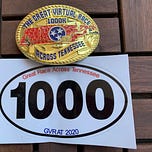If you’re enjoying the newsletter, please consider subscribing!
Dvora here. Today marks the newsletter’s first foray into audio. I watched a whole Substack how-to video about how to create this post so hopefully I won’t fuck things up too terribly. Anyway, watching that video and typing these words is about all of the credit I can claim for what you’re about to listen to—everything else here comes from Lela Moore, writer and runner extraordinaire, who copyedits this newsletter and who you might remember from this great post about Simone Biles’ humanity and this interview with Eloise the Cat. (Also, she just did this great breakdown of the coverage of 2021 Women’s Gymnastics NCAA Championships for FanSided.)
Lela recently took a podcast production class during which she produced a full-length episode about the role that race and racism play in running. She sent it to me for a listen and I really liked it. And I thought that you guys would also enjoy it. I asked if she would be willing to share it with you newsletter people and she agreed.
Now that’s more than enough from me. Lela, take it away from here.
Hi everyone, and thanks, Dvora, for the nice intro.
Here’s a little background on what you’re about to listen to: Prompted by good ol’ Covid-19, I decided to run the Great Virtual Race Across Tennessee (GVRAT) last May. I am a native Tennessean, and given that I couldn’t visit my family during the pandemic, this seemed like an interesting way to say hello from a distance. This was a 1,000-kilometer (620ish-mile) race that participants had up to four months - until August - to complete. It meant, roughly, running five miles a day.
The race was directed by Gary Cantrell, known to runners as Lazarus “Laz” Lake for reasons I’m still not really sure about. You’ll hear more about Laz in the podcast, but he’s known to runners as the director of some of the toughest ultramarathons (races over 26.2 miles) in the business. When I was about 50 miles from completing my trek, the Facebook page for the group was blown up by controversy. A fellow runner, Ben Chan, had written a post celebrating his finishing the GVRAT to the group accompanied by a photo of himself in a Black Lives Matter singlet, and his post was removed because, Laz said, it violated the “no political posts” rule. In reality, it was taken down because so many white men wanted their “safe space” back. I, and many other runners, were shocked, and we pushed back; to us, this was not a political issue, but a human one. Chan protested, too, to no avail; Laz later removed him from another race he directed because Chan wanted to name his team Black Lives Matter.
When I signed up for a podcasting class in February, I knew I wanted my work to address racism in the running industry. I saw firsthand how the protests, and the calls for a more diverse, equitable, and inclusive running industry after George Floyd’s murder in May were handled within the industry. (That is to say, poorly.) The story of how Ben Chan got kicked out of an event with 20,000 runners for promoting Black Lives Matter by a white race director was an important one for showing just how reluctant the white men who run the industry are to let other views be heard.
Running is run by white men, and they like it that way.




